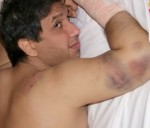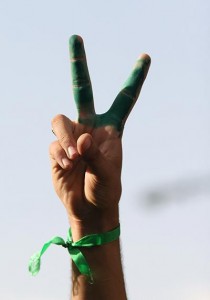Iran: Human Rights Round-up (7-14 February 2010)
 Wednesday, February 17, 2010 at 6:37
Wednesday, February 17, 2010 at 6:37  Ali Karroubi
Ali KarroubiThe week of 22 Bahman saw many arrests and further human rights violations in Iran. The highest profile incident involved the son of Mehdi Karroubi. Ali Karroubi was arrested last Thursday as he tried to provide security for his father. (Mehdi Karroubi’s usual security guard had failed to report earlier --- apparently they had been detained.) Ali was arrested and taken, with others, to the Amiral Momenin Mosque where he was beaten along with other detainees. Fatemeh Karroubi, Ali’s mother, published an open letter to Iran’s Supreme Leader, Ayatollah Khamenei, appealing for an end to such abuses. In her letter, and according to other reports, Ali was recognized as guards were registering the detainees by name. Once the agents got the order from higher officials, he was separated from other detainees, beaten repeatedly and threatened with rape. He was later released. (See separate entry for later initiatives by Fatemeh Karroubi and Ali's brother Hossein.)
The Week in Brief
Sunday 7 February
(News round-up from Pedestrian):
- Hamid Yahyavi, (University of Tehran student arrested on 1 February), was released on February 7th.
- Ali Gholitabar & Morteza Saremi (members of the Mojahedin), who were arrested the day after Ashura (December 26th), released on bail.
- Maryam Ghanbari (lawyer and women’s rights activist) arrested at her home on 1 February.
- Akbar Montajebi (journalist) arrested 7 February. (Literary critic for ISNA) arrested.
- Ehsan Mehrabi (reporter for Farhikhtegan, arrested.
- Somayeh Momeni (reporter for Nasim Bidari, former ISNA reporter and a member of the 1 Million Signatures Campaign arrested.
- Ali Kolayi (member of Human Rights Watch) arrested. [NB: As Mr Kolayi is completing his military service his case has been handed to a military court; this is his third arrest.]
- On 5 February 2010 Ebrahim Yazdi was transferred to Atiyeh hospital by prison official at Evin. Despite opposition from his doctors, officials took him back to prison on the evening of 6 February.
- Naemeh Doostdar, (poet, writer, reporter and blogger) arrested and transferred to Evin Prison.
- Unconfirmed reports suggest at least 14 more students of Amir Kabir University, Tehran were arrested following continuing protests.
Monday 8 February
- A group of Iranian journalists wrote an open letter to foreign reporters invited by Iran’s government to attend and provide media coverage on the anniversary the Islamic Revolution on 11 February: “…expose their shows, and listen to the true calls of the Iranian people. And on this historic trip relay and report the innocence of the Iranian people. This is the expectation that your suffering fellow journalists have of you.”
- According to HRANA at least five members of the “mourning mothers” were arrested.
- Shirko Moarefi is one of 21 Kurdish political prisoners currently awaiting execution in Iran. His mother, Roghiyeh Ebn-Abass told RAHANA that she sees no difference between her son and other political prisoners who are awaiting execution: “Our children belong to the young generation of this land, and they are its most valuable asset. Don’t execute them.”
- The International Campaign for Human Rights in Iran stronglycondemned the prosecution of student activist, Mohammad Amin Valian, under the charge of Moharebeh.
- Mirazee Saeedeh, children’s rights activist, arrested and taken to unknown location, as she was helping a group of street kids on 27 January. News of Mirazee’s arrest came out in the same report as news of the arrest of Nazari Babak, another children’s rights activist, arrested 8 February and also taken to an unknown location.
- On her release from prison Kaveh Ahangar sent an urgent message warning Iranians that her interrogators had had all her text messaging and phone call information.
- Siamack Nadali (former head of the Islamic Students Association at Lorestan University) arrested.
Tuesday 9 February
- 18 mothers of imprisoned activists issued a statement protesting the continued ill-treatment of their children.
- Dr. Mohammad Maleki (arrested in August 2009) was recently transferred to ward 7 of Evin Prison as a result of his deteriorating health condition.
- Mansour Osanlou was taken into solitary confinement in the "dog-cell section" of Evin on 21 February.
- Reporters without Borders published a report deploring the fact that more than 65 journalists are now detained in the Islamic Republic of Iran. It’s report listed nine journalists arrested between 6-8 February: Akbar Montajabi (of Etemad-e Mell), Ahmad Jalali Farahani (latterly of Meher News agency), Mahsa JaziniIran), (Isfahan-based daily Somayeh Momeni (Nasim Bidary), Zeynab Kazem-Khah, (ISNA news agency), Amir Sadeghi (a photographer with Farhangh Ashti), Hassan Zohouri (Mirass Farhanghi news agency), Ehsan Mehrabi (Farhikhteghan) and Vahid Pourostad (Farhikhteghan).
- Nine people recently tried in the Revolutionary Court for their roles in the Ashura protests received their sentences. One person was sentenced to execution; eight others received prison sentences – all nine had been charged with mohareb.
- Shabnam and Farzad Madadzadeh (arrested in February 2009) charged with mohareb and sentenced to five years in prison.
- Siamak Nadali (former secretary of the Islamic Student Association in the University of Lorestan) arrested.
- Lawyer Forough Mirzaei and Mahin Fahimi, a member of “Mothers for Peace, released.
- Alireza Beheshti (Adviser to Mir Houssein Mousavi) released.
- Ali Malihi, (journalist with Etemad-e) arrested.
- 69-year old reformist politician Behzad Nabavi sentenced to five years in prison.
- Mostafa Tajzadeh (member of the Islamic Iran Participation Front and the Mujahidin of the Islamic Revolution Organisation) chose not to defend himself in his second “show trial” in Tehran.
- Feyzollah Arabsorkhi (member of the MKO) appeared in Judge Salvati’s court where bail was set at one Billion Toman [$1 Million].
- HRANA reported that at least eight political and social activists were arrested in Tabriz; three were released but five were being held for further questioning. List: Dr. Ghafar Farzadi (Member of Freedom Movement), Oroojali Mohammadi (Former governor of Tabriz and member of the [Islamic reformist] Participation Front), Dr. Asef Hajizadeh (member of the office of the Consolidation of Unity), Dr. Jalil Yaghoubzadeh (reformist), Dr. Sadrinia- (national and religion activist), Vahid Sheikhbeigloo (reformist), Abbas Pourazhari (activist) and Azizi- (activist). Of these, Mr. Azizi, Dr. Hajizadeh, and Dr. Yaghoubzadeh were released after a few hours.
Wednesday 10 February
- Mohammad Reza Tajik released.
- Safoura Tofangchi and her husband Abolhassan Darolshafayi arrested, after being summoned by the Ministry of Intelligence. Their two daughters, Banafsheh and Jamileh, were also reportedly arrested a few days earlier.
- Mehri Nabavi (wife of Ali) and Seyyed Zohour Nabavi arrested in separate towns. They were transferred to solitary confinement in the prison of the Ministry of Intelligence.
- Tehran Prosecutor finally told the families of Alireza Firoozi and Sourena Hashemi that both students held at Tehran’s Evin Prison.
- Ali Vakili Rad, the man convicted of the assassination of former Iranian PM Shahpour Baktia outside Paris in 1991, may be freed from a Paris prison and deported to Iran, according to his lawyer.
- Mohammad Taghi Karroubi, Medhi Karroubi’s son, said that several former Revolutionary Guards and others who had volunteered to protect his father on 22 Bahman had been “called for questioning and had not returned home”. He told Radio Farda that they had: “probably been arrested”.
Thursday 11 February
- Zahra Rahnavard, a leading protest leader and wife of opposition leader Mir Houssein Mousavi, was “attacked and badly beaten” by plain-clothed and security forces whilst making her way to the 22 Bahman rally at Sadeqiyeh Square, Tehran.
- Ali Karroubi (son of Mehdi Karroubi) was arrested, tortured and abused according to many reports. On 14 February his mother, Fatemeh Karroubi, published an open letter to the Supreme Leader. This detailed what had happened to her son and called for an end to such abuses.
- In a 30 second phone call, Shiva Nazar Ahari told her family about her transfer to: “a cage-like solitary cell”.
Friday 12 February
- Amnesty International sent a report to the UN in advance of its review of human rights on Monday 15 February pointing out how distorted the Regime’s view of its human rights record was: “"The Iranian authorities seem either to have lost touch with reality or are unwilling to acknowledge it".
- Three Iranian unions also wrote to the UN for its (then) forthcoming review: "we are struggling in a hell made of poverty".
- Amin Nazari (head of the human rights unit of the Advar Tahkim Vahdat Organization) arrested in Tehran on his way to a hospital to undergo spinal cord surgery.
- Reza Pahlavi, (son of the late Shah of Iran) said the international community "must step up its support for Iran's opposition movement and stop focusing on the country's nuclear program."
- Salman Sima and Sasan Aghayi transferred from section 7 of Evin Prison to the infamous ward 350.
- Human rights lawyer Shadi Sadr addressed the United Nations: “In addition to the numerous examples of human rights that are systematically violated…during the post-election events, basic and fundamental human rights remain in serious peril, such as equality of persons before the law, the right to peaceful assembly, the rights of political prisoners, and the rights of human rights defenders and civil society activists.”
Saturday 13 February
- Political prisoners in Gohardasht prison published a statement about the Regime’s actions, particularly on 22 Bahman: “Not only did they fill every step of the streets with security and plainclothes forces, but they did not spare us, the prisoners, either….”
- Ahmad Karimi, (arrested more than a month before Iran's June 2009 election) sentenced to execution after being included in a mass trial for detainees linked to the post-election protests.
Sunday 14 February
- The blogger and rights activist, Ali Kalayi, released after posting $50,000 bail. Kalayi was arrested on 7 February.
- Alireza Firoozi and Sourena Hashemi remain in solitary confinement , despite the Prosecutor’s order for their transfer to the public ward in Tehran’s Evin Prison. [NB: The Tehran Prosecutor only admitted to their families that the students were detained at Evin on 10 February.]
- A comprehensive list of prisoners published. At present this is only available in Persian but it’s possible a translation will become available in the coming week.
- Writer Alireza Saghafi released.
*Hat-tip to friends, too many to mention, and to Pedestrian, Persian2English, Amnesty International, RAHANA (Reporters and Human Rights Activists in Iran), ICHRR (Iran Committee of Human Rights Reporters) and all other human rights organisations mentioned above and omitted in error!




